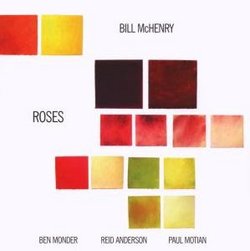Product Description"There are tons of young, jazz saxophonists out there pursuing ideas of harmony and structure and rhythm, but [Bill McHenry] has something rare going for him he has a sound." - Ben Ratliff, The New York Times.
The goal for any jazz musician is to have a sound and a style that immediately identifies them. The Maine-born, New York-based tenor saxophonist Bill McHenry has both qualities in unlimited measure. Saxophonistically speaking, his robust tenor voice springs from the sonic signatures of Ornette Coleman and Dewey Redman. His musical concepts encompass Coleman's harmolodic style of group improvisation and Bill Evans's circular, syncopated séances. Since his debut in 1997, McHenry has been one of the impressive sidemen of his era, playing with everybody, from John Stetch and Andrew Cyrille to Norah Jones, and as a leader in his own right, with four CDs.
Roses is his new recording and Sunnyside debut, and it is his most commanding statement to date. He's backed by a powerful cast, featuring guitarist Ben Monder, bassist Reid Anderson, and the legendary Paul Motian the original drummer in Bill Evans's terrific trio. McHenry captains an exploratory four-man crew deep in the eye of a jazz hurricane that simultaneously swings in a myriad of inventions and dimensions. According to Steve Smith of Time Out New York, who saw this group at the Village Vanguard, "Like Coleman, McHenry possesses a gift for unspooling elliptical melodies that nonetheless linger in the mind's ear, which are then wrapped in Monder's dense chords ... Anderson's reflexes are so sharp as to verge on prescience ... [and] Motian propels the group with constantly shifting patterns dependent more on touch and timbre than steady beat."
The tracks on Roses bear out Smith's observations. The leadoff, title track is mid-tempo and in a meditative mode, followed by hypnotic bass ostinato on "African Song" laced with unison guitar/sax melodic lines. On "The Abyss Opens Up," Motian weaves some sly, post bop drumlines toward the song s climax, contrasted by Monder's Hendrixian, fuzz-tone strains on "The City," and "The New One." The last track, "Photo-Synthetic" is a dynamic duo with Monder and McHenry.
McHenry's omniscient artistry is the product of an eclectic musical education. Born in Blue Hill, Maine in 1972, he started playing saxophone at the age of ten, and entered Interlochen Arts Academy in Michigan four years later. He studied for two years at the New England Conservatory in Boston with Jimmy Giuffre, George Russell, and George Garzone. After his move to Brooklyn in 1992, McHenry dove head first into the Big Apple's jazz scene, before briefly relocating to Barcelona with pianist Ben Waltzer where they recorded a CD entitled Jazz Is Where You Find It (Fresh Sound, 1997). That same year, he released his debut recording as a leader, Rest Stop, on the same label, along with his subsequent releases Graphic (1999), Bill McHenry Quartet Featuring Paul Motian (2003), and Sonic Pressure (2007). As a sideman he's recorded with an impressive array of musicians including Guillermo Klein's Los Guachos II and Los Guachos II (Sunnyside 1999/2002), John Stetch's Heaven of a Hundred Days (Justin Time 2000), and Norah Jones's Not Too Late (Blue Note 2007). He also is a faculty member at the Maine Jazz Camp.


 Track Listings (9) - Disc #1
Track Listings (9) - Disc #1